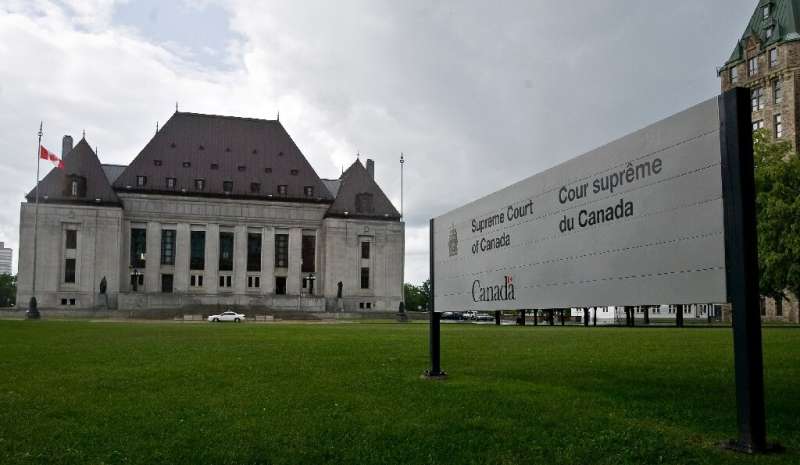#Top court upholds Canada’s carbon tax, key to climate plan

“#Top court upholds Canada’s carbon tax, key to climate plan”

The Supreme Court of Canada on Thursday upheld a national carbon tax that is the centrepiece of Prime Minister Justin Trudeau’s climate plan, rejecting a constitutional challenge by several provinces.
The federal government imposed the levy in 2019 in order to meet its obligations under the 2015 Paris climate agreement to cut greenhouse gas emissions by 30 percent by 2030, from 2005 levels.
Initially set at Can$20 (US$16) per tonne of emissions, the carbon pricing scheme—which applies to a range of fuels and sources of CO2 emissions—is to incrementally rise to Can$170 per tonne by the end of the decade. This would be equivalent to about 28 cents per liter of gasoline.
The 6-3 ruling paves the way for Canada to press ahead also with its ambitious goal of reaching net-zero emissions by mid-century.
“As of today, the federal government will continue to use a price on pollution as one key element of its comprehensive climate plan because climate change impacts Canadians no matter where they live in this country,” Environment Minister Jonathan Wilkinson told a news conference.
He noted that more than 40 nations have either a carbon tax or a carbon trading system, while adding that “pricing pollution is the most economically efficient way to reduce emissions while concurrently driving innovation.”
Canada is the world’s fourth-largest oil producer and the fifth-largest CO2 emitter on a per capita basis, according to data compiled by the International Energy Agency.
Chief Justice Richard Wagner, writing for the majority, said in the decision: “Addressing climate change requires collective national and international action… because the harmful effects of GHGs (greenhouse gases) are, by their very nature, not confined by borders.”
The court found that the federal parliament “has jurisdiction to enact this law as a matter of national concern under the peace, order and good government clause of the constitution.”
‘Existential threat’
Oil-rich Alberta and Saskatchewan provinces, as well as Ontario, rejected the federal backstop on their own carbon pricing schemes that don’t measure up to the national minimum price on carbon. It has only been applied in those three provinces, as well as Manitoba.
Saskatchewan Premier Scott Moe tweeted his reaction to the ruling, saying the federal Greenhouse Gas Pollution Pricing Act is “bad environmental policy, bad economic policy, and simply wrong.”
Federal opposition leader Erin O’Toole, meanwhile, vowed this week to get rid of the national carbon tax if his Tories unseat Trudeau’s Liberals in the next election.
He said Thursday the Liberal policy threatens “hundreds of thousands of jobs” and is pushing energy investments to the United States.
Other opposition parties and environmental groups hailed the ruling, but urged even tougher climate actions, while business associations welcomed the regulatory clarity it provides.
“Putting a price on pollution is important, but it’s not nearly enough,” said New Democratic Party MP Laurel Collins, who called on the government to boost clean energy investments and make big polluters pay more.
Ottawa argued in court that climate change is a national threat requiring a federal response, but the provinces pushed back at the federal intrusion on their jurisdiction over the environment.
The court noted that provinces left to regulate emissions on their own risked failing to address this “existential threat.” It said it could take just one of the 10 provinces to straggle for nationwide efforts to collapse, threatening “Canada as a whole.”
As such, federal intrusion on provincial jurisdiction in this specific case is justified, it concluded.
The most recent report presented by the Canadian government showed that Canada’s CO2 emissions increased by two percent between 2017 and 2018.
Canada to impose carbon tax on provinces bucking climate action
© 2021 AFP
Citation:
Top court upholds Canada’s carbon tax, key to climate plan (2021, March 25)
retrieved 25 March 2021
from https://phys.org/news/2021-03-court-canada-carbon-tax-key.html
This document is subject to copyright. Apart from any fair dealing for the purpose of private study or research, no
part may be reproduced without the written permission. The content is provided for information purposes only.
If you liked the article, do not forget to share it with your friends. Follow us on Google News too, click on the star and choose us from your favorites.
For forums sites go to Forum.BuradaBiliyorum.Com
If you want to read more Like this articles, you can visit our Science category.



